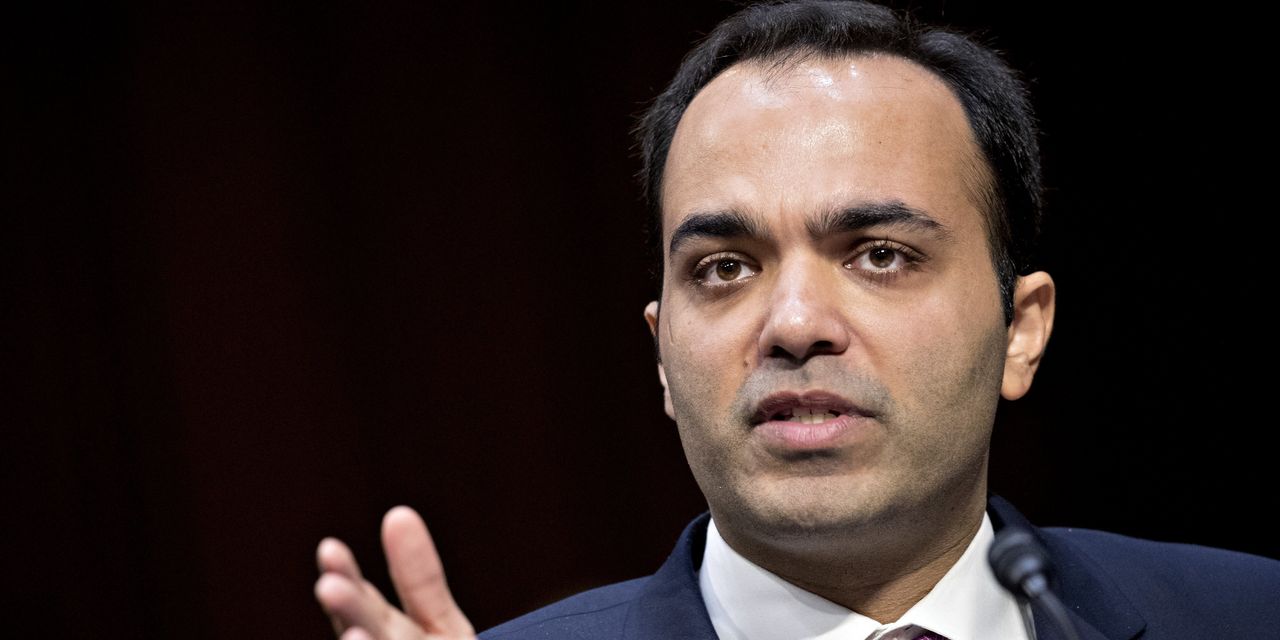The Federal Deposit Insurance Corporation is led by a five-member board, which for decades has delegated day-to-day operations to its chairman, who by statute serves a five-year term. This structure was designed to ensure independence from changing political administrations and has led to a long legacy of collegiality. For 88 years the chairman has controlled the board agenda and worked collaboratively with other board members.
That all changed on Oct. 31, when board member
Rohit Chopra
presented me with a draft request for information on bank mergers. Two-and-a-half weeks earlier, Mr. Chopra had been sworn in as director of the Consumer Finance Protection Bureau, a position entitling him to a seat on the FDIC board.
The FDIC has long-established processes for working on policy documents, which are initially drafted by career staff with subject-matter expertise and decades of experience. That the CFPB director would serve the FDIC chairman with a finished document requesting public comment about the FDIC’s merger review process and insist on its publication was unprecedented.
Moreover, whoever prepared the document presented by Mr. Chopra didn’t understand the FDIC’s merger-approval process particularly well. The FDIC staff reviewed the document and found it was filled with omissions, misrepresentations and technical inaccuracies.
In the spirit of collegiality, I expressed to board members my willingness to work with them on a document drafted by the FDIC staff that would better reflect the agency’s historical approach and do so on an expedited basis to meet their desired timing.
On Nov. 16, as I was about to board a flight to Switzerland for a meeting of international regulators, I informed board member
Michael Hsu,
acting comptroller of the currency, that the FDIC staff document would be available to board members no later than Dec. 6. Seventy-five minutes later, the directors sent a joint letter instructing FDIC staff to mark up their original document instead. Agency staff report to me as the CEO, and I have always ensured that board members have access to staff for discussions, briefings and technical expertise. The board members’ letter was an attempt to seize control of the FDIC’s staff while its chairman was on a nine-hour flight to Europe for official meetings.
At 5 p.m. on Nov. 26—the day after Thanksgiving—a deputy to Mr. Chopra sent an email from his CFPB account to the FDIC board distribution list, purporting to circulate a vote on the document Mr. Chopra prepared. This was a brazen attempt to seize control from the FDIC executive secretary, who alone is in charge of official board distributions. Board members were immediately notified by the FDIC’s general counsel that the CFPB’s communication didn’t constitute a valid board distribution and therefore couldn’t be recorded as official board action.
On Dec. 6, the FDIC staff produced a document to board members that was factual and neutral in tone, informed by the expertise of career staff—a genuine effort to solicit public feedback without politicizing the agency or the process. It asked broad-based questions on the statutory factors that govern merger applications and whether the FDIC’s existing approach is appropriate.
Within hours of receiving that document, board members responded by attempting to vote on the original CFPB document. Board member
Martin Gruenberg,
a former chairman, electronically signed his alleged vote on Dec. 3, three days before receiving the FDIC document for review. When board members were informed that their actions didn’t constitute a valid vote, Messrs. Chopra and Gruenberg posted their document on the CFPB’s website and claimed it was an official FDIC issuance.
Of the 20 chairmen who preceded me at the FDIC, nine faced a majority of the board members from the opposing party, including Mr. Gruenberg as chairman under President Trump until I replaced him as chairman in 2018. Never before has a majority of the board attempted to circumvent the chairman to pursue their own agenda.
This conflict isn’t about bank mergers. If it were, board members would have been willing to work with me and the FDIC staff rather than attempt a hostile takeover of the FDIC internal processes, staff and board agenda.
This episode is an attempt to wrest control from an independent agency’s chairman with a change in the administration. More than that, it’s an example of the erosion of America’s democracy. Many government institutions are built on norms and practices that encourage parties to work together. This foundation depends on agency leaders who recognize that the long-term benefits of cooperation outweigh the short-term incentive to blow up institutions in pursuit of immediate partisan gains. Since the FDIC’s founding in 1933, all 72 board members have respected that foundation. Until now.
When I arrived in the U.S. from Yugoslavia alone on my 18th birthday, I had $500 in my pocket. I came to this country with a firm belief in a system of government built upon the rule of law. In the old country, those in power all too often changed the rules and circumvented protocols to enact their preferred policies. When I was sworn in as chairman, I promised myself that I would lead the FDIC with deliberation and due care.
The FDIC’s core mission to protect depositors resonates with me. My family’s meager savings disappeared overnight when a local bank collapsed at the onset of Yugoslavia’s civil war. Yugoslavia didn’t have deposit insurance. At 68, my father went to work as a laborer earning $5 a day. You don’t need that kind of firsthand experience to understand why stability at the FDIC is paramount for our nation.
I will continue to manage the agency pursuant to the oath I took. And my door is always open to those willing to engage in a manner that befits the venerated institution we are privileged to serve.
Ms. McWilliams has been chairman of the FDIC since 2018.
Copyright ©2021 Dow Jones & Company, Inc. All Rights Reserved. 87990cbe856818d5eddac44c7b1cdeb8
